Unit 2 同步知识点复习 课件38张缺少音频
文档属性
| 名称 | Unit 2 同步知识点复习 课件38张缺少音频 | 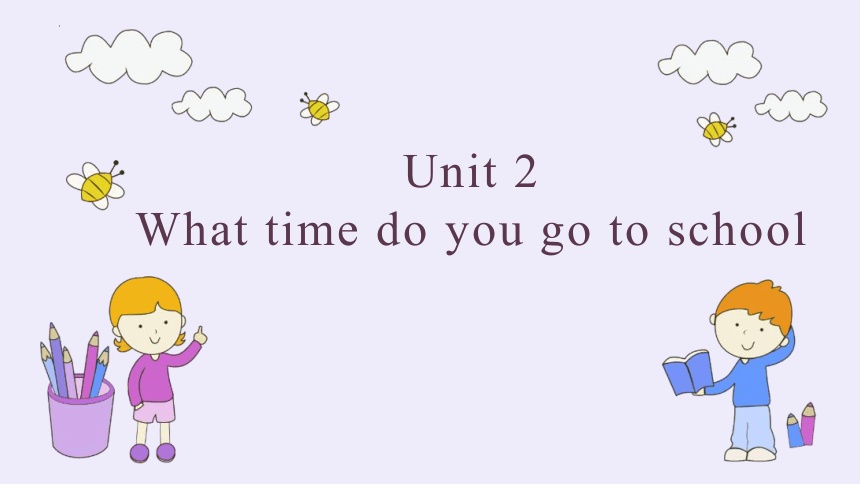 | |
| 格式 | pptx | ||
| 文件大小 | 487.5KB | ||
| 资源类型 | 教案 | ||
| 版本资源 | 人教新目标(Go for it)版 | ||
| 科目 | 英语 | ||
| 更新时间 | 2022-04-06 19:56:09 | ||
图片预览

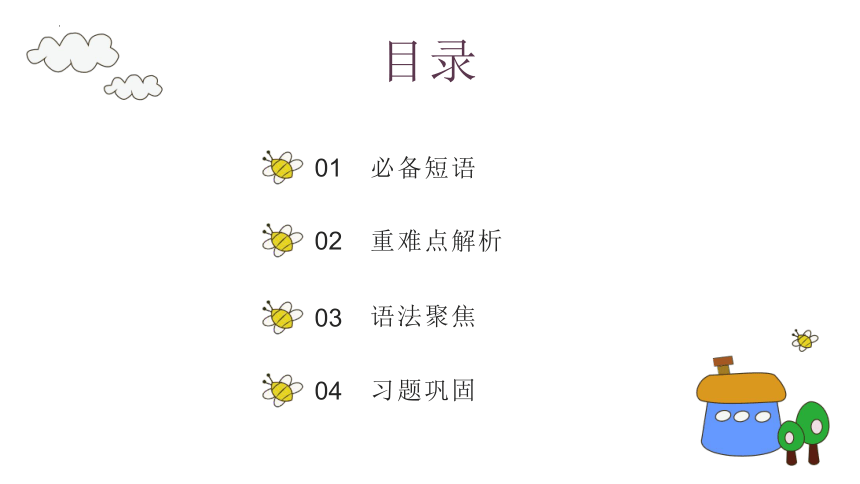
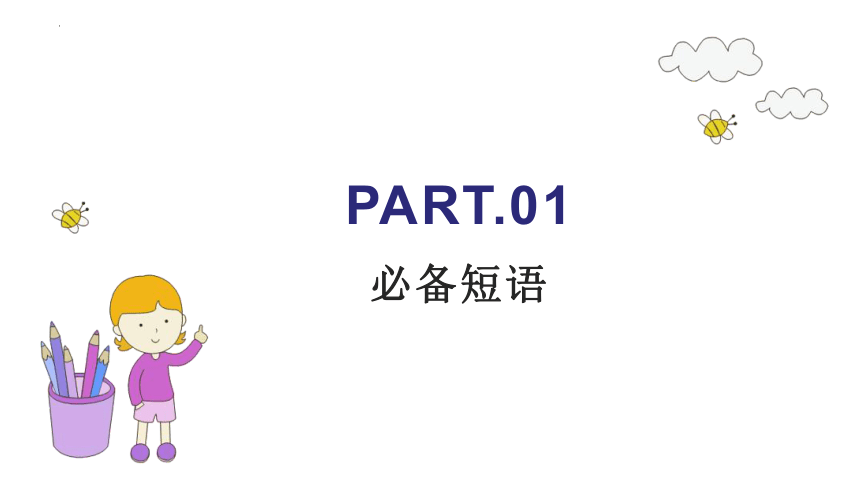
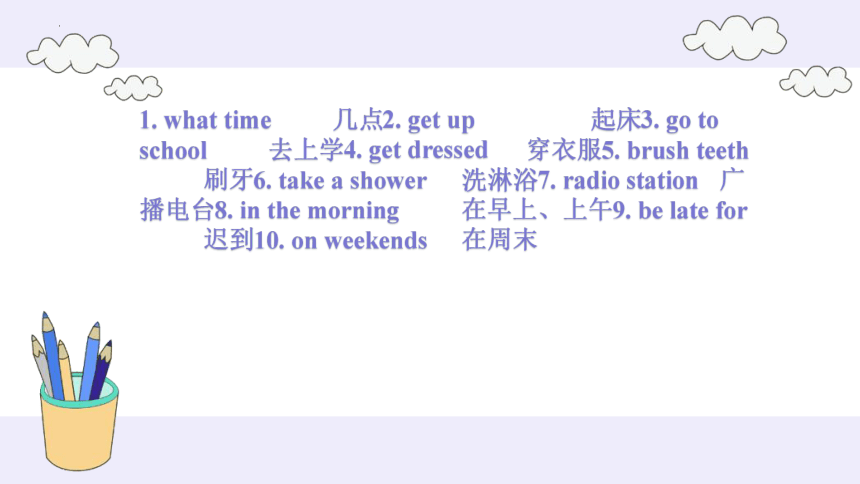
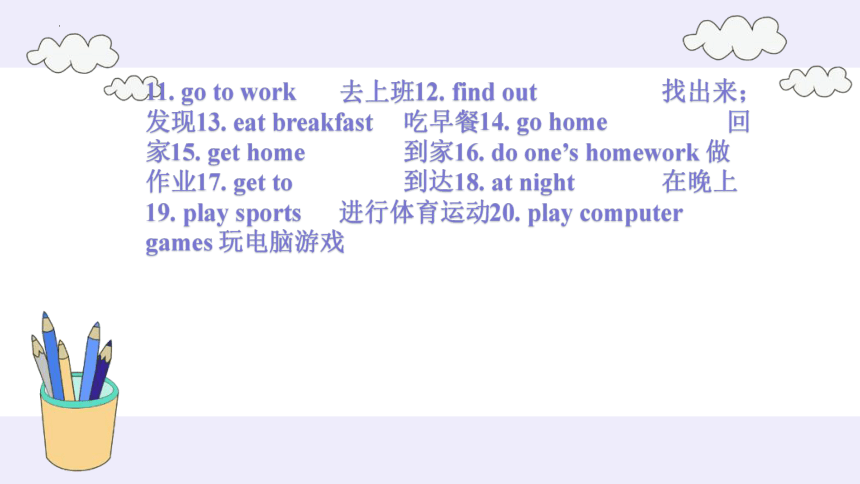
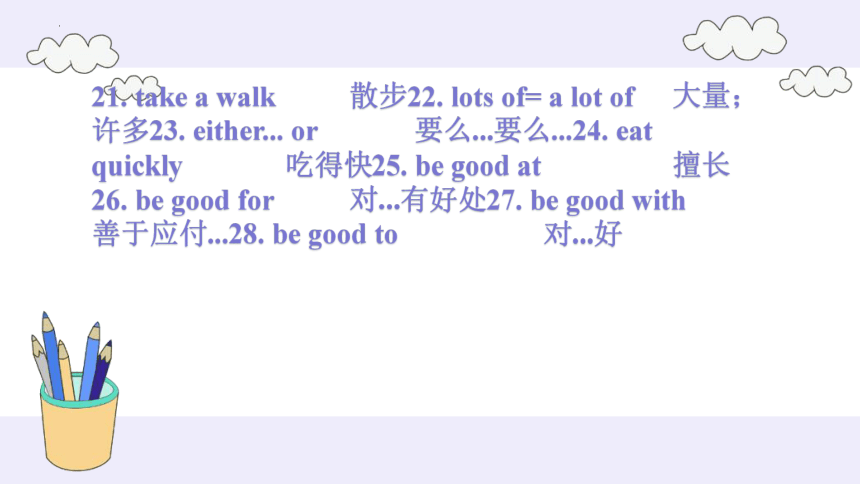
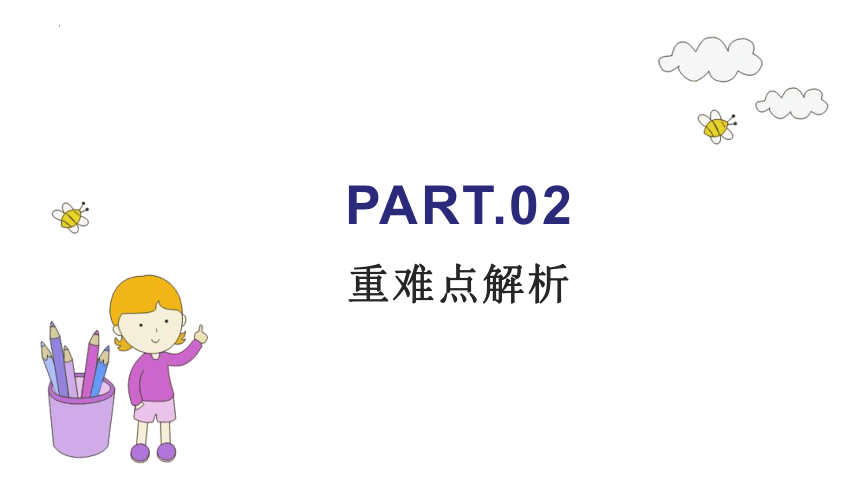
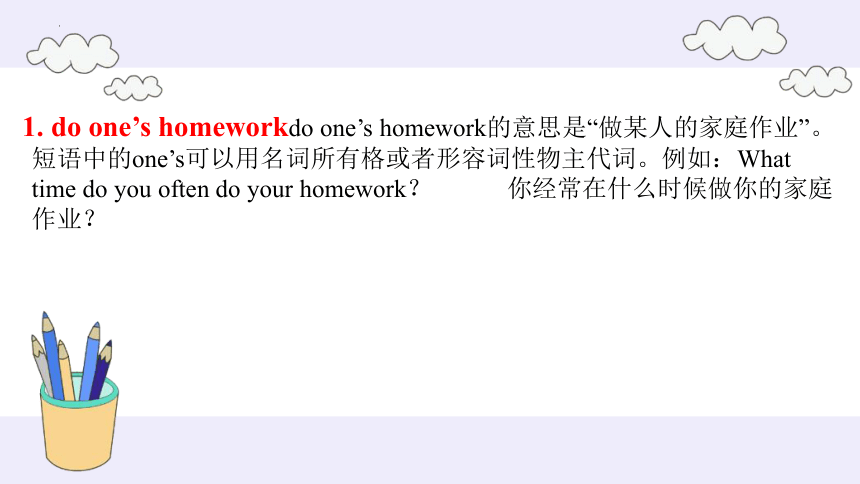
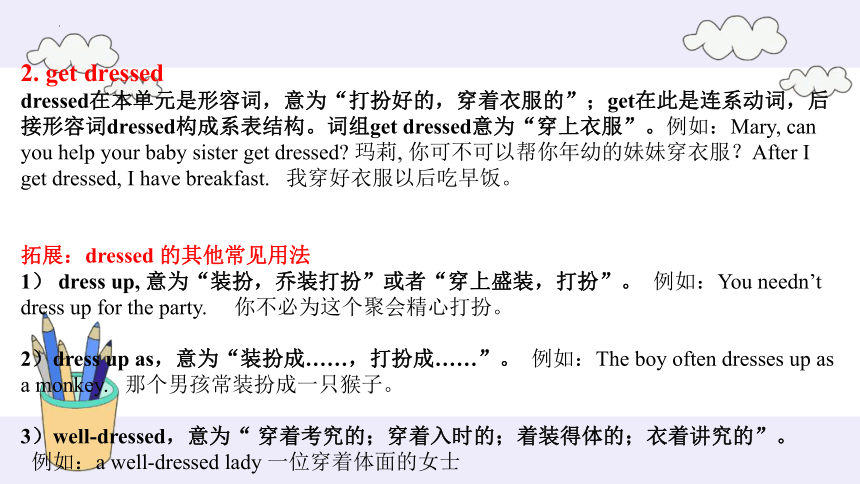
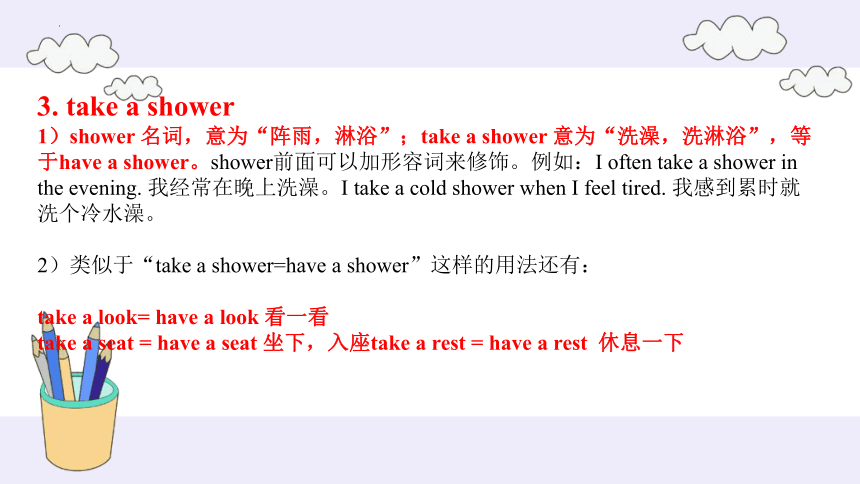
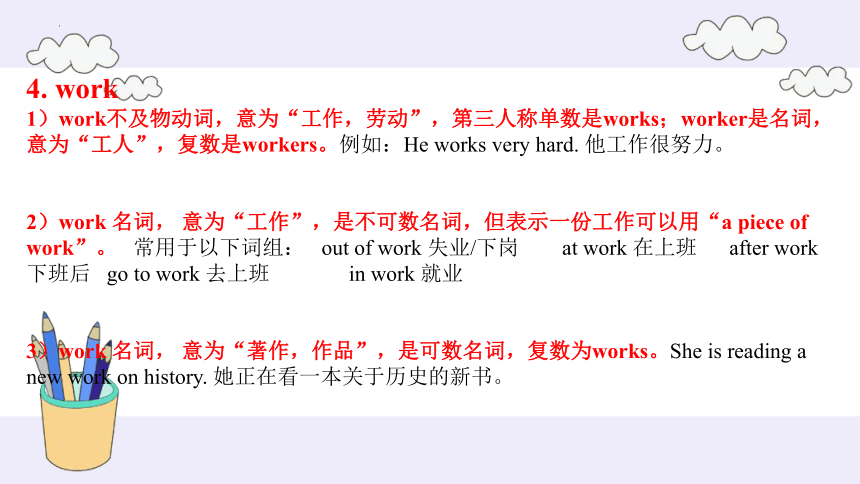
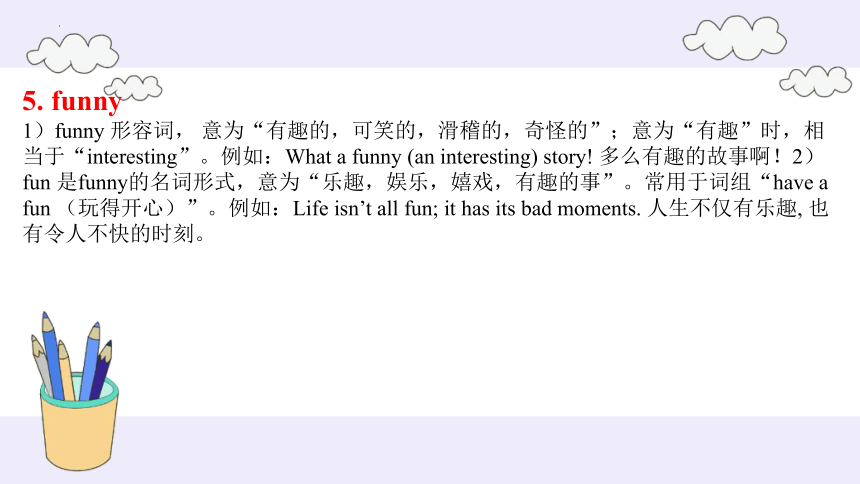
文档简介
(共38张PPT)
Unit 2
What time do you go to school
必备短语
重难点解析
语法聚焦
习题巩固
01
02
03
04
目录
PART.01
必备短语
1. what time 几点2. get up 起床3. go to school 去上学4. get dressed 穿衣服5. brush teeth 刷牙6. take a shower 洗淋浴7. radio station 广播电台8. in the morning 在早上、上午9. be late for 迟到10. on weekends 在周末
11. go to work 去上班12. find out 找出来;发现13. eat breakfast 吃早餐14. go home 回家15. get home 到家16. do one’s homework 做作业17. get to 到达18. at night 在晚上19. play sports 进行体育运动20. play computer games 玩电脑游戏
21. take a walk 散步22. lots of= a lot of 大量;许多23. either... or 要么...要么...24. eat quickly 吃得快25. be good at 擅长26. be good for 对...有好处27. be good with 善于应付...28. be good to 对...好
PART.02
重难点解析
1. do one’s homeworkdo one’s homework的意思是“做某人的家庭作业”。短语中的one’s可以用名词所有格或者形容词性物主代词。例如:What time do you often do your homework? 你经常在什么时候做你的家庭作业?
2. get dressed
dressed在本单元是形容词,意为“打扮好的,穿着衣服的”;get在此是连系动词,后接形容词dressed构成系表结构。词组get dressed意为“穿上衣服”。例如:Mary, can you help your baby sister get dressed 玛莉, 你可不可以帮你年幼的妹妹穿衣服?After I get dressed, I have breakfast. 我穿好衣服以后吃早饭。
拓展:dressed 的其他常见用法
1) dress up, 意为“装扮,乔装打扮”或者“穿上盛装,打扮”。 例如:You needn’t dress up for the party. 你不必为这个聚会精心打扮。
2)dress up as,意为“装扮成……,打扮成……”。 例如:The boy often dresses up as a monkey. 那个男孩常装扮成一只猴子。
3)well-dressed,意为“ 穿着考究的;穿着入时的;着装得体的;衣着讲究的”。
例如:a well-dressed lady 一位穿着体面的女士
3. take a shower
1)shower 名词,意为“阵雨,淋浴”;take a shower 意为“洗澡,洗淋浴”,等于have a shower。shower前面可以加形容词来修饰。例如:I often take a shower in the evening. 我经常在晚上洗澡。I take a cold shower when I feel tired. 我感到累时就洗个冷水澡。
2)类似于“take a shower=have a shower”这样的用法还有:
take a look= have a look 看一看
take a seat = have a seat 坐下,入座take a rest = have a rest 休息一下
4. work
1)work不及物动词,意为“工作,劳动”,第三人称单数是works;worker是名词,意为“工人”,复数是workers。例如:He works very hard. 他工作很努力。
2)work 名词, 意为“工作”,是不可数名词,但表示一份工作可以用“a piece of work”。 常用于以下词组: out of work 失业/下岗 at work 在上班 after work 下班后 go to work 去上班 in work 就业
3)work 名词, 意为“著作,作品”,是可数名词,复数为works。She is reading a new work on history. 她正在看一本关于历史的新书。
5. funny
1)funny 形容词, 意为“有趣的,可笑的,滑稽的,奇怪的”;意为“有趣”时,相当于“interesting”。例如:What a funny (an interesting) story! 多么有趣的故事啊!2)fun 是funny的名词形式,意为“乐趣,娱乐,嬉戏,有趣的事”。常用于词组“have a fun (玩得开心)”。例如:Life isn’t all fun; it has its bad moments. 人生不仅有乐趣, 也有令人不快的时刻。
5. funny
1)funny 形容词, 意为“有趣的,可笑的,滑稽的,奇怪的”;意为“有趣”时,相当于“interesting”。例如:What a funny (an interesting) story! 多么有趣的故事啊!2)fun 是funny的名词形式,意为“乐趣,娱乐,嬉戏,有趣的事”。常用于词组“have a fun (玩得开心)”。例如:Life isn’t all fun; it has its bad moments. 人生不仅有乐趣, 也有令人不快的时刻。
6. exercise
1)exercise 作动词,意为“运动,锻炼”等时,既可以作及物动词也可以作不及物动词。例如:Every day I exercise before I go to sleep. (不及物动词)我每天睡觉前锻炼。We should constantly exercise our muscles. (及物动词) 我们应当经常锻炼肌肉。
2)exercise 作名词,意为“练习,操”等时,是可数名词。意为“锻炼”时,是不可数名词。 例如:We should do eye exercises. 我们应该做眼保健操。Let's take exercise together. 让我们一起锻炼吧。
7. quarter
1)quarter 作名词时,可以译为“四分之一”或者“一刻钟”。例如:A quarter of the apples are green. 有四分之一的苹果是青的。 It’s a quarter past seven. 七点一刻了。
2)quarter作动词时,可以译为“把…四等分”。例如:We should quarter the pineapple. 我们应该把这个菠萝分成四等份。
8. taste
1)taste做行为动词时,既可以是及物动词也可以是不及物动词,意为“吃,品尝,喝,”等。例如:I can taste something sour. 我尝到了酸味。(及物动词) Sometimes when you are ill, you can't taste properly. (不及物动词)有时生病时吃什么都没有滋味。
2)taste做连系动词时,后面跟名词或者形容词作表语,构成主系表结构;意为“吃起来,尝起来”。
例如: The soup tastes good. 这汤的味道不错。
3)taste 还可以作名词,意为“味道,味觉,品味”等。例如:I like the taste of wine. 我喜欢葡萄酒的味道。
9. life
life 名词,既可以是可数名词也可以是不可数名词。作“生活”讲时,是不可数名词;作“生命”讲时是可数名词,其复数是“lives”。例如:Life is like a journey. 生活像一次旅行。(不可数)Three people lost their lives in the accident. 事故中三人丧生。(可数)
拓展:常见的使用life的词组有live a … life 过……的日子 lose one's life 丧生 save one’s life 救……的命give one’s life 献身 come (back) to life 复活
10. usually
1)usually是频度副词,意为“通常”,常位于系动词、助动词或情态动词之后,实义动词之前,在句子中作状语; 但有时也可以放在句首修饰整个句子。例如:I usually go to school at seven o’clock. 我通常七点去上学。
2)usually的形容词是usual,意为“通常的,平常的”。常用于词组as usual,意为“像平常一样”。它的反义词是unusual,意为“罕有的,不同寻常的”。例如:She goes to work as usual. 她像平常一样去上班了。It was an unusual day for summer. 这是夏季少有的一天。
11. brush1)brush 作动词,意为“刷,擦”,三单形式是brushes。常用于以下短语中:brush one’s teeth / shoes / hair 刷牙/擦鞋/ 梳头。例如:Please brush your shoes. 请把你的鞋擦一下。 I brush my teeth every day. 我每天都刷牙。
2)brush 作名词,意为“刷子,画笔,毛笔”,是可数名词,其复数是brushes。例如:I can paint a picture with a brush. 我可以用刷子画画。
12. tooth
tooth 名词,意为“牙齿”,可数名词。其复数形式是特殊变化teeth。例如:The dentist took out two of my teeth. 牙医拔掉了我两颗牙。拓展:
1)一些名词的复数是不规则变化的。 例如:foot → feet(脚) child → children(孩子) man→men (男人) woman→ women(女人) mouse → mice(老鼠)
2)还有一些名词的单复数是一样的。 例如:sheep→sheep(绵羊) deer→deer(鹿) Chinese→Chinese(中国人) Japanese→Japanese(日本人)
3)还有些名词是集合名词,本身就是复数的概念,不需要再变复数。 例如:cattle 牛 people 人,人们 police 警察
1. He works at a radio station. ★介词 at 常用于具体时刻之前,意为“在…”,如:at 5:00 在5:00钟。o’clock=of the clock 表示 …点钟 ,通常是整点,如:six/seven/eight o’clock 六/七/八点钟。介词at 除了指时间以外,还可指:①.人物的所在之处,如:at my uncle’s home 在我叔叔家, at the station 在火车站。 ②.朝向,如:Look at me! 看我! ③.指速度或价格。 如:She buys the book at a good price. 她以优惠的价格买了这本书。 ④.用于固定搭配,如at noon; at night; laugh at sb.
1.Jimmy is coming to Beijing by plane. I’ll meet him _____ the airport.A. on B. at C. off D. for2. –When will the Opening Ceremony(开幕式) of London Olympics begin - ______ 20:12 of July 27, 2017.A. In B. On C. At D. By
2. They usually exercise on weekends. ★
on:①.主要用在星期几,具体某一天或某一天的早、中、晚或节日前。
如: on Mid-autumn Day 在中秋节 on June 1st 在6月1日 on a warm spring afternoon 在一个温暖的春天的下午②.表示方位,意为“在…上面”,表示两物体接触 如:There is a cup on the table. 桌子上有一个杯子。 on the farm 在农场上③.表示与某地毗邻的关系 如:Hubei is on the north of Hunan. 湖北在湖南的北部。1.–When is the party - It’s ____ Saturday. A. in B. on C. at D. for2. It’s nice to have a walk _____ a cool summer evening.A. in B. at C. for D. on
3. I do my homework at 6:30. ★释:do homework意为做家庭作业,其中homework为不可数名词,这个短语=do one’s lessons.相关的短语还有 do house work 做家务
练习:1. 我通常晚饭后做作业I often my after dinner.2.My sister often does her homework at 9:30.(改为否定句) My sister at 9:30.
4. They always get dressed at seven twenty. ★dress的用法:dress sb 给某人穿衣服get dressed 穿衣,打扮be dressed in 穿着…衣服;
练习:1.那位女士穿着白色衬衣。The lady is a white skirt. 2.你给孩子们穿衣好吗?Will you the children
5. That’s a funny time for breakfast! ★
time常和介词for搭配,表示做…的时间
如:We don’t have too much time for sports.
我们没有太多时间开展体育活动。Time for dinner, children. Go and wash your hands, please.
孩子们,该吃饭了。请去洗手吧。
练习:1.Stop talking, boys. It’s time _____ class. A. to B. for C. in D. with
6. I either watch TV or play computer games. ★either…or…主要用于表示选择,其意为“要么……要么…;或者……或者……”,用于连接两个性质相同的词或短语。如:You can have either this one or that one. 你拿这个或那个都可以。 You must either go at once or wait till tomorrow. 你要么马上走,要么等到明天。 【注意】either…or…连接两个成分作主语时,谓语动词通常与其靠近的主语保持一致。如:Either you or I am to go. 你或我必须有人去。 而either :1.(两者之中)任一的
You may go by either road. 你两条路都可以走。
2.(两者之中)每一方的;每一的
She studied history and philosophy, but she had little interest in either subject. 她学过历史和哲学;但对这两门课都没有多少兴趣。
3. 副词(用在否定句中)“也;而且;根本”If you don't go, I won't either. 你如不去,我也不去。 It won't do them any good, but it won't do them any harm either. 这对他们没有好处,但也没有坏处。练习:
1.【2017广州中考】-Which would you prefer, a pear or an apple - ______. An orange, please. A. None B. Either C. Neither D. Both
2.不是这星期就是下星期我们就可完成这项工作。 We can finish the work either this week or next week.
3.要么他对,要么你对。 Either he or you are right.
PART.03
语法聚焦
1.频率副词用法
①.I usually get up at five o’clock. 我通常在五点钟起床。句中usually与often 一样都是频度副词,常用于动词be 之后,行为动词之前。反义词为:unusually。
如:They usually have four classes in the morning. They usually do some shopping on Sunday.
often意为“时常;经常”,反义词为: seldom。 如:She often helps her mother with her housework after school. We often go to see our teacher.
②.always 意思是“总是,永远”,表示动作重复,状态继续,通常用来修饰动词的一般时态。 如:We always get up before six o'clock.
③.sometimes表示“有时”的意思,说明的是偶尔发生的事情或情况。它的位置比较灵活,可置于句首、句中、句末。 如:Sometimes I come on foot. 有时我步行来。 It is sometimes hot and sometimes cold here. 这里有时,热有时冷。④.hardly “几乎不”,含有否定意思。 如:They hardly watch TV. 他们几乎不看电视
⑤. never “决不”,完全否定,语气较强烈。 如:Never tell him the news. 千万不要告诉他这个消息。 He never went shopping when he was young. 他年轻时从不去逛街。
表示频率的副词“大小”依次递减:
always>usually>often>sometimes>hardly>never
练习:
1. -I saw you come to school by bus this morning. -Oh, I ____ come to school by bus, but it is raining today.
A. hardly B. always C. sometimes D. usually
2. Love will _____ last if we love the whole fine things around us. A. hardly ever B. never C. always D. sometimes
3.-Can you understand what I meant -Sorry, I can ____ follow you. A. always B. almost C. nearly D. hardly
2.时间表达: 例句:-What time is it?-几点了?-It’s eight thirty. 八点三十分。释:本句是就具体时刻进行提问的,what time 意为“几点”,这是特殊问句,它的同义句为:What’s the time /What time is it 在回答这个句子时,要用It’s +钟点。
注:英语时刻的表达法:顺读法和逆读法。
①顺读法:钟点数+分钟数。例如:4:25→four twenty-five,6:58→six fifty-eight,7:→seven o’clock说明:这种表达不论分钟数是多少,均可使用。
②逆读法:分钟为+介词to/past+钟点数,可分两种情况:
1)分钟为不超过半小时,用分钟数+past(/pa:st/ 过)+钟点数。例如:4:23→twenty-three past four,5:19→ nineteen past five.
2)分钟数超过了半小时,用(所差的)分钟的+to+(下一个)钟点为。例如:7:31→twenty-nine to eight,10:58→two to eleven
说明:在逆读法中分钟数逢 “五”逢 “十”可省略minute(s)。否则应加上。当然,英语习惯上把十五分钟(fifteen)称作一刻a quarter,三十分钟(thirty)称为half,因此10:30,可以用两种表达方式,half past ten,ten thirty.
练习:
1. - ___________________ -It’s eight-thirty. A. What it is time B. What time is it C. What time they are D. What time it is 2. It’s 6 o’clock now.(对划线部分提问) is it 3.分别用两种时间表达的方式写出下列时间: 6:50
10:22
2:30
11:45
4.你什么时候起床? do you usually
PART.04
习题巩固
1. My brother often _____ English on the radio . A. hears B. listens C. listen to D. listens to
2. It’s six o’clock in the morning. It’s time ________. A. get up B. for get up C. to get up D. of getting up
3. My father ______ his coat and goes to work. A. put on B. puts in C. puts on D. put in
4. When ____ your mother take a shower A. does B. is C. do D. are
5. My father often ______ home at six o’clock in the evening. A. go B. gets C. goes to D. gets to
6. My brother often goes to _____ school after ______ breakfast. A. /; the B. the; the C. the; / D. /; /7. -Do you have a _____ -Yes. I _____ at a food shop. A. job; work B. work; work C. work; job D. job; job8. -______ does your father go to work every day - He goes to work at half past six. A. How B. What C. What time D. How time9. -What time do you usually go to bed -_______ nine o’clock. A. At B. On C. In D. of 10. Thank you very much for _____ me to your birthday party. A. ask B. to ask C. invite D. inviting
11. Please tell me something _______ your new teacher.A. in B. for C. about D. on
12. It’s time ______ class.A. to B. for C. of D. with
13. -Do you know the______ -Yes, it’s 10:30. A.age B. time C. number D. address
14. What do you usually do ______ Sunday morning A. to B. at C. on D. in
15. Do you like _____ a bus to school A. takes B. taking C. take D. by
Unit 2
What time do you go to school
必备短语
重难点解析
语法聚焦
习题巩固
01
02
03
04
目录
PART.01
必备短语
1. what time 几点2. get up 起床3. go to school 去上学4. get dressed 穿衣服5. brush teeth 刷牙6. take a shower 洗淋浴7. radio station 广播电台8. in the morning 在早上、上午9. be late for 迟到10. on weekends 在周末
11. go to work 去上班12. find out 找出来;发现13. eat breakfast 吃早餐14. go home 回家15. get home 到家16. do one’s homework 做作业17. get to 到达18. at night 在晚上19. play sports 进行体育运动20. play computer games 玩电脑游戏
21. take a walk 散步22. lots of= a lot of 大量;许多23. either... or 要么...要么...24. eat quickly 吃得快25. be good at 擅长26. be good for 对...有好处27. be good with 善于应付...28. be good to 对...好
PART.02
重难点解析
1. do one’s homeworkdo one’s homework的意思是“做某人的家庭作业”。短语中的one’s可以用名词所有格或者形容词性物主代词。例如:What time do you often do your homework? 你经常在什么时候做你的家庭作业?
2. get dressed
dressed在本单元是形容词,意为“打扮好的,穿着衣服的”;get在此是连系动词,后接形容词dressed构成系表结构。词组get dressed意为“穿上衣服”。例如:Mary, can you help your baby sister get dressed 玛莉, 你可不可以帮你年幼的妹妹穿衣服?After I get dressed, I have breakfast. 我穿好衣服以后吃早饭。
拓展:dressed 的其他常见用法
1) dress up, 意为“装扮,乔装打扮”或者“穿上盛装,打扮”。 例如:You needn’t dress up for the party. 你不必为这个聚会精心打扮。
2)dress up as,意为“装扮成……,打扮成……”。 例如:The boy often dresses up as a monkey. 那个男孩常装扮成一只猴子。
3)well-dressed,意为“ 穿着考究的;穿着入时的;着装得体的;衣着讲究的”。
例如:a well-dressed lady 一位穿着体面的女士
3. take a shower
1)shower 名词,意为“阵雨,淋浴”;take a shower 意为“洗澡,洗淋浴”,等于have a shower。shower前面可以加形容词来修饰。例如:I often take a shower in the evening. 我经常在晚上洗澡。I take a cold shower when I feel tired. 我感到累时就洗个冷水澡。
2)类似于“take a shower=have a shower”这样的用法还有:
take a look= have a look 看一看
take a seat = have a seat 坐下,入座take a rest = have a rest 休息一下
4. work
1)work不及物动词,意为“工作,劳动”,第三人称单数是works;worker是名词,意为“工人”,复数是workers。例如:He works very hard. 他工作很努力。
2)work 名词, 意为“工作”,是不可数名词,但表示一份工作可以用“a piece of work”。 常用于以下词组: out of work 失业/下岗 at work 在上班 after work 下班后 go to work 去上班 in work 就业
3)work 名词, 意为“著作,作品”,是可数名词,复数为works。She is reading a new work on history. 她正在看一本关于历史的新书。
5. funny
1)funny 形容词, 意为“有趣的,可笑的,滑稽的,奇怪的”;意为“有趣”时,相当于“interesting”。例如:What a funny (an interesting) story! 多么有趣的故事啊!2)fun 是funny的名词形式,意为“乐趣,娱乐,嬉戏,有趣的事”。常用于词组“have a fun (玩得开心)”。例如:Life isn’t all fun; it has its bad moments. 人生不仅有乐趣, 也有令人不快的时刻。
5. funny
1)funny 形容词, 意为“有趣的,可笑的,滑稽的,奇怪的”;意为“有趣”时,相当于“interesting”。例如:What a funny (an interesting) story! 多么有趣的故事啊!2)fun 是funny的名词形式,意为“乐趣,娱乐,嬉戏,有趣的事”。常用于词组“have a fun (玩得开心)”。例如:Life isn’t all fun; it has its bad moments. 人生不仅有乐趣, 也有令人不快的时刻。
6. exercise
1)exercise 作动词,意为“运动,锻炼”等时,既可以作及物动词也可以作不及物动词。例如:Every day I exercise before I go to sleep. (不及物动词)我每天睡觉前锻炼。We should constantly exercise our muscles. (及物动词) 我们应当经常锻炼肌肉。
2)exercise 作名词,意为“练习,操”等时,是可数名词。意为“锻炼”时,是不可数名词。 例如:We should do eye exercises. 我们应该做眼保健操。Let's take exercise together. 让我们一起锻炼吧。
7. quarter
1)quarter 作名词时,可以译为“四分之一”或者“一刻钟”。例如:A quarter of the apples are green. 有四分之一的苹果是青的。 It’s a quarter past seven. 七点一刻了。
2)quarter作动词时,可以译为“把…四等分”。例如:We should quarter the pineapple. 我们应该把这个菠萝分成四等份。
8. taste
1)taste做行为动词时,既可以是及物动词也可以是不及物动词,意为“吃,品尝,喝,”等。例如:I can taste something sour. 我尝到了酸味。(及物动词) Sometimes when you are ill, you can't taste properly. (不及物动词)有时生病时吃什么都没有滋味。
2)taste做连系动词时,后面跟名词或者形容词作表语,构成主系表结构;意为“吃起来,尝起来”。
例如: The soup tastes good. 这汤的味道不错。
3)taste 还可以作名词,意为“味道,味觉,品味”等。例如:I like the taste of wine. 我喜欢葡萄酒的味道。
9. life
life 名词,既可以是可数名词也可以是不可数名词。作“生活”讲时,是不可数名词;作“生命”讲时是可数名词,其复数是“lives”。例如:Life is like a journey. 生活像一次旅行。(不可数)Three people lost their lives in the accident. 事故中三人丧生。(可数)
拓展:常见的使用life的词组有live a … life 过……的日子 lose one's life 丧生 save one’s life 救……的命give one’s life 献身 come (back) to life 复活
10. usually
1)usually是频度副词,意为“通常”,常位于系动词、助动词或情态动词之后,实义动词之前,在句子中作状语; 但有时也可以放在句首修饰整个句子。例如:I usually go to school at seven o’clock. 我通常七点去上学。
2)usually的形容词是usual,意为“通常的,平常的”。常用于词组as usual,意为“像平常一样”。它的反义词是unusual,意为“罕有的,不同寻常的”。例如:She goes to work as usual. 她像平常一样去上班了。It was an unusual day for summer. 这是夏季少有的一天。
11. brush1)brush 作动词,意为“刷,擦”,三单形式是brushes。常用于以下短语中:brush one’s teeth / shoes / hair 刷牙/擦鞋/ 梳头。例如:Please brush your shoes. 请把你的鞋擦一下。 I brush my teeth every day. 我每天都刷牙。
2)brush 作名词,意为“刷子,画笔,毛笔”,是可数名词,其复数是brushes。例如:I can paint a picture with a brush. 我可以用刷子画画。
12. tooth
tooth 名词,意为“牙齿”,可数名词。其复数形式是特殊变化teeth。例如:The dentist took out two of my teeth. 牙医拔掉了我两颗牙。拓展:
1)一些名词的复数是不规则变化的。 例如:foot → feet(脚) child → children(孩子) man→men (男人) woman→ women(女人) mouse → mice(老鼠)
2)还有一些名词的单复数是一样的。 例如:sheep→sheep(绵羊) deer→deer(鹿) Chinese→Chinese(中国人) Japanese→Japanese(日本人)
3)还有些名词是集合名词,本身就是复数的概念,不需要再变复数。 例如:cattle 牛 people 人,人们 police 警察
1. He works at a radio station. ★介词 at 常用于具体时刻之前,意为“在…”,如:at 5:00 在5:00钟。o’clock=of the clock 表示 …点钟 ,通常是整点,如:six/seven/eight o’clock 六/七/八点钟。介词at 除了指时间以外,还可指:①.人物的所在之处,如:at my uncle’s home 在我叔叔家, at the station 在火车站。 ②.朝向,如:Look at me! 看我! ③.指速度或价格。 如:She buys the book at a good price. 她以优惠的价格买了这本书。 ④.用于固定搭配,如at noon; at night; laugh at sb.
1.Jimmy is coming to Beijing by plane. I’ll meet him _____ the airport.A. on B. at C. off D. for2. –When will the Opening Ceremony(开幕式) of London Olympics begin - ______ 20:12 of July 27, 2017.A. In B. On C. At D. By
2. They usually exercise on weekends. ★
on:①.主要用在星期几,具体某一天或某一天的早、中、晚或节日前。
如: on Mid-autumn Day 在中秋节 on June 1st 在6月1日 on a warm spring afternoon 在一个温暖的春天的下午②.表示方位,意为“在…上面”,表示两物体接触 如:There is a cup on the table. 桌子上有一个杯子。 on the farm 在农场上③.表示与某地毗邻的关系 如:Hubei is on the north of Hunan. 湖北在湖南的北部。1.–When is the party - It’s ____ Saturday. A. in B. on C. at D. for2. It’s nice to have a walk _____ a cool summer evening.A. in B. at C. for D. on
3. I do my homework at 6:30. ★释:do homework意为做家庭作业,其中homework为不可数名词,这个短语=do one’s lessons.相关的短语还有 do house work 做家务
练习:1. 我通常晚饭后做作业I often my after dinner.2.My sister often does her homework at 9:30.(改为否定句) My sister at 9:30.
4. They always get dressed at seven twenty. ★dress的用法:dress sb 给某人穿衣服get dressed 穿衣,打扮be dressed in 穿着…衣服;
练习:1.那位女士穿着白色衬衣。The lady is a white skirt. 2.你给孩子们穿衣好吗?Will you the children
5. That’s a funny time for breakfast! ★
time常和介词for搭配,表示做…的时间
如:We don’t have too much time for sports.
我们没有太多时间开展体育活动。Time for dinner, children. Go and wash your hands, please.
孩子们,该吃饭了。请去洗手吧。
练习:1.Stop talking, boys. It’s time _____ class. A. to B. for C. in D. with
6. I either watch TV or play computer games. ★either…or…主要用于表示选择,其意为“要么……要么…;或者……或者……”,用于连接两个性质相同的词或短语。如:You can have either this one or that one. 你拿这个或那个都可以。 You must either go at once or wait till tomorrow. 你要么马上走,要么等到明天。 【注意】either…or…连接两个成分作主语时,谓语动词通常与其靠近的主语保持一致。如:Either you or I am to go. 你或我必须有人去。 而either :1.(两者之中)任一的
You may go by either road. 你两条路都可以走。
2.(两者之中)每一方的;每一的
She studied history and philosophy, but she had little interest in either subject. 她学过历史和哲学;但对这两门课都没有多少兴趣。
3. 副词(用在否定句中)“也;而且;根本”If you don't go, I won't either. 你如不去,我也不去。 It won't do them any good, but it won't do them any harm either. 这对他们没有好处,但也没有坏处。练习:
1.【2017广州中考】-Which would you prefer, a pear or an apple - ______. An orange, please. A. None B. Either C. Neither D. Both
2.不是这星期就是下星期我们就可完成这项工作。 We can finish the work either this week or next week.
3.要么他对,要么你对。 Either he or you are right.
PART.03
语法聚焦
1.频率副词用法
①.I usually get up at five o’clock. 我通常在五点钟起床。句中usually与often 一样都是频度副词,常用于动词be 之后,行为动词之前。反义词为:unusually。
如:They usually have four classes in the morning. They usually do some shopping on Sunday.
often意为“时常;经常”,反义词为: seldom。 如:She often helps her mother with her housework after school. We often go to see our teacher.
②.always 意思是“总是,永远”,表示动作重复,状态继续,通常用来修饰动词的一般时态。 如:We always get up before six o'clock.
③.sometimes表示“有时”的意思,说明的是偶尔发生的事情或情况。它的位置比较灵活,可置于句首、句中、句末。 如:Sometimes I come on foot. 有时我步行来。 It is sometimes hot and sometimes cold here. 这里有时,热有时冷。④.hardly “几乎不”,含有否定意思。 如:They hardly watch TV. 他们几乎不看电视
⑤. never “决不”,完全否定,语气较强烈。 如:Never tell him the news. 千万不要告诉他这个消息。 He never went shopping when he was young. 他年轻时从不去逛街。
表示频率的副词“大小”依次递减:
always>usually>often>sometimes>hardly>never
练习:
1. -I saw you come to school by bus this morning. -Oh, I ____ come to school by bus, but it is raining today.
A. hardly B. always C. sometimes D. usually
2. Love will _____ last if we love the whole fine things around us. A. hardly ever B. never C. always D. sometimes
3.-Can you understand what I meant -Sorry, I can ____ follow you. A. always B. almost C. nearly D. hardly
2.时间表达: 例句:-What time is it?-几点了?-It’s eight thirty. 八点三十分。释:本句是就具体时刻进行提问的,what time 意为“几点”,这是特殊问句,它的同义句为:What’s the time /What time is it 在回答这个句子时,要用It’s +钟点。
注:英语时刻的表达法:顺读法和逆读法。
①顺读法:钟点数+分钟数。例如:4:25→four twenty-five,6:58→six fifty-eight,7:→seven o’clock说明:这种表达不论分钟数是多少,均可使用。
②逆读法:分钟为+介词to/past+钟点数,可分两种情况:
1)分钟为不超过半小时,用分钟数+past(/pa:st/ 过)+钟点数。例如:4:23→twenty-three past four,5:19→ nineteen past five.
2)分钟数超过了半小时,用(所差的)分钟的+to+(下一个)钟点为。例如:7:31→twenty-nine to eight,10:58→two to eleven
说明:在逆读法中分钟数逢 “五”逢 “十”可省略minute(s)。否则应加上。当然,英语习惯上把十五分钟(fifteen)称作一刻a quarter,三十分钟(thirty)称为half,因此10:30,可以用两种表达方式,half past ten,ten thirty.
练习:
1. - ___________________ -It’s eight-thirty. A. What it is time B. What time is it C. What time they are D. What time it is 2. It’s 6 o’clock now.(对划线部分提问) is it 3.分别用两种时间表达的方式写出下列时间: 6:50
10:22
2:30
11:45
4.你什么时候起床? do you usually
PART.04
习题巩固
1. My brother often _____ English on the radio . A. hears B. listens C. listen to D. listens to
2. It’s six o’clock in the morning. It’s time ________. A. get up B. for get up C. to get up D. of getting up
3. My father ______ his coat and goes to work. A. put on B. puts in C. puts on D. put in
4. When ____ your mother take a shower A. does B. is C. do D. are
5. My father often ______ home at six o’clock in the evening. A. go B. gets C. goes to D. gets to
6. My brother often goes to _____ school after ______ breakfast. A. /; the B. the; the C. the; / D. /; /7. -Do you have a _____ -Yes. I _____ at a food shop. A. job; work B. work; work C. work; job D. job; job8. -______ does your father go to work every day - He goes to work at half past six. A. How B. What C. What time D. How time9. -What time do you usually go to bed -_______ nine o’clock. A. At B. On C. In D. of 10. Thank you very much for _____ me to your birthday party. A. ask B. to ask C. invite D. inviting
11. Please tell me something _______ your new teacher.A. in B. for C. about D. on
12. It’s time ______ class.A. to B. for C. of D. with
13. -Do you know the______ -Yes, it’s 10:30. A.age B. time C. number D. address
14. What do you usually do ______ Sunday morning A. to B. at C. on D. in
15. Do you like _____ a bus to school A. takes B. taking C. take D. by
同课章节目录
- Unit 1 Can you play the guitar?
- Section A
- Section B
- Unit 2 What time do you go to school?
- Section A
- Section B
- Unit 3 How do you get to school?
- Section A
- Section B
- Unit 4 Don't eat in class.
- Section A
- Section B
- Unit 5 Why do you like pandas?
- Section A
- Section B
- Unit 6 I'm watching TV.
- Section A
- Section B
- Review of Units 1-6
- Unit 7 It's raining!
- Section A
- Section B
- Unit 8 Is there a post office near here?
- Section A
- Section B
- Unit 9 What does he look like?
- Section A
- Section B
- Unit 10 I'd like some noodles.
- Section A
- Section B
- Unit 11 How was your school trip?
- Section A
- Section B
- Unit 12 What did you do last weekend?
- Section A
- Section B
